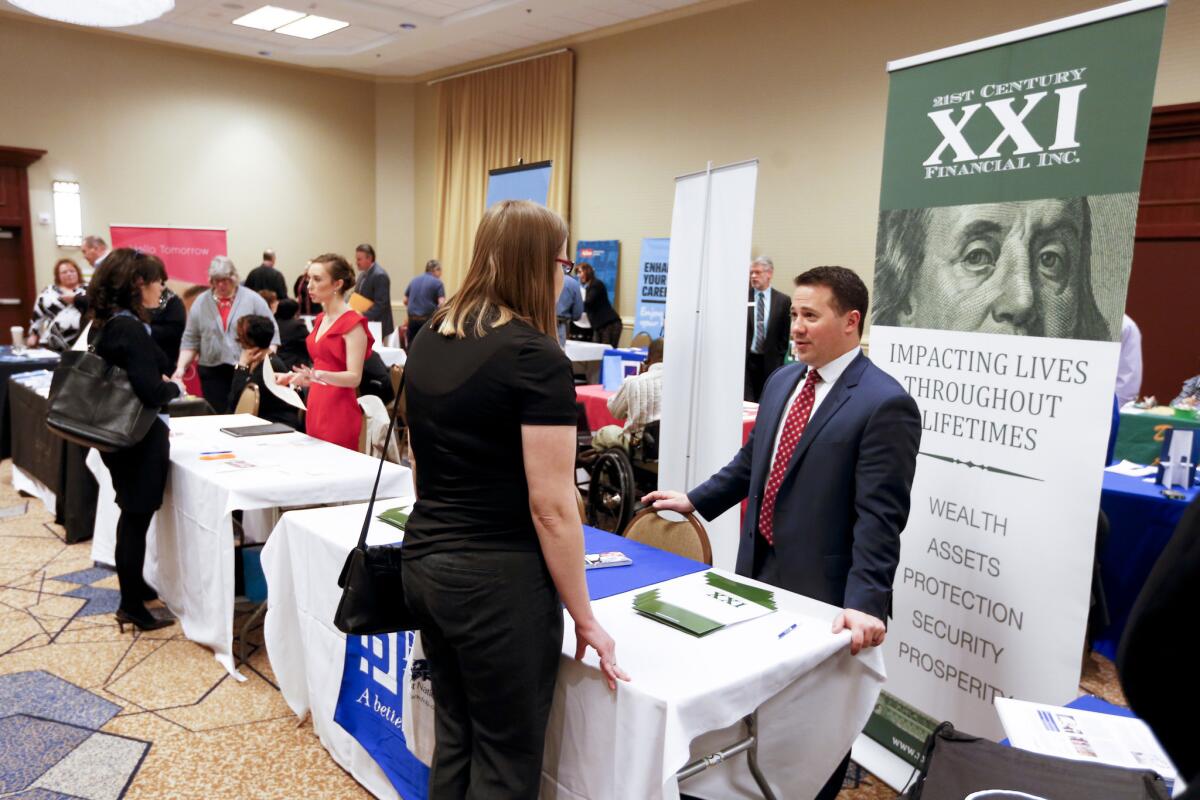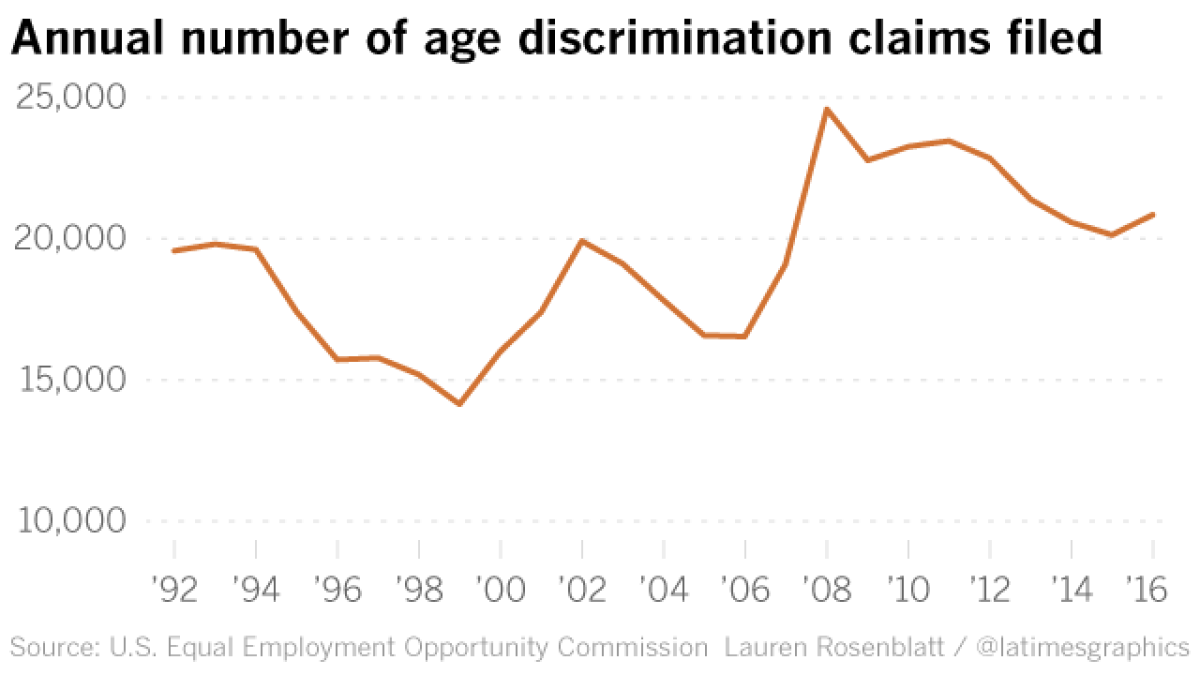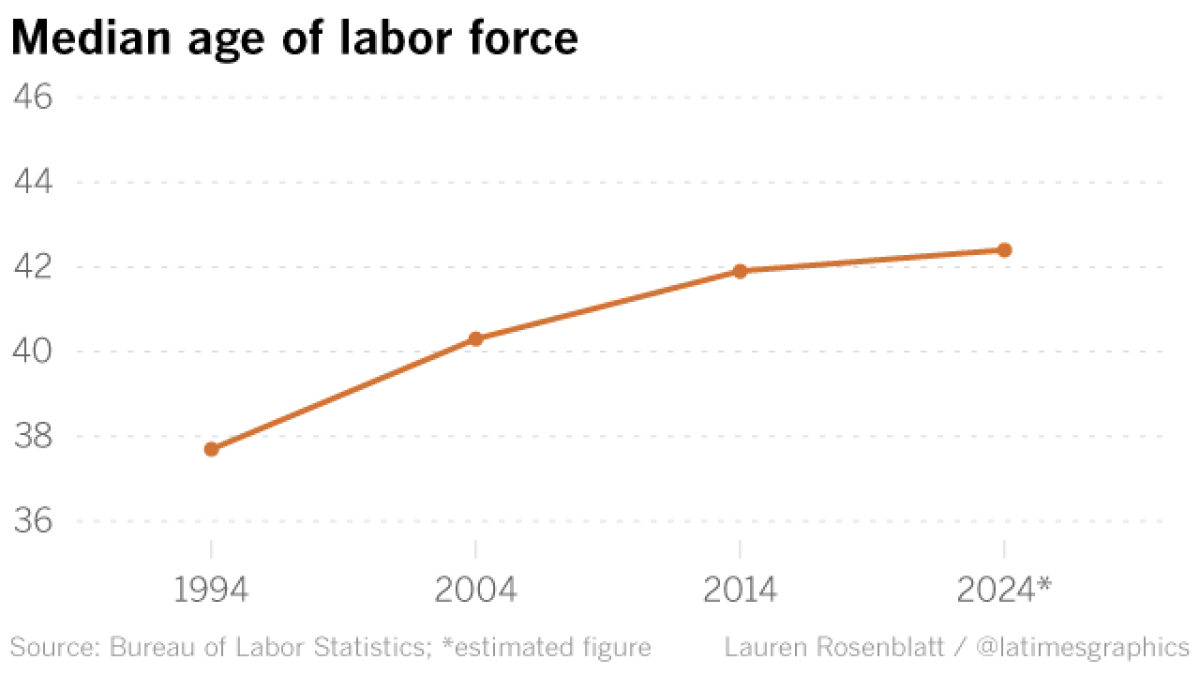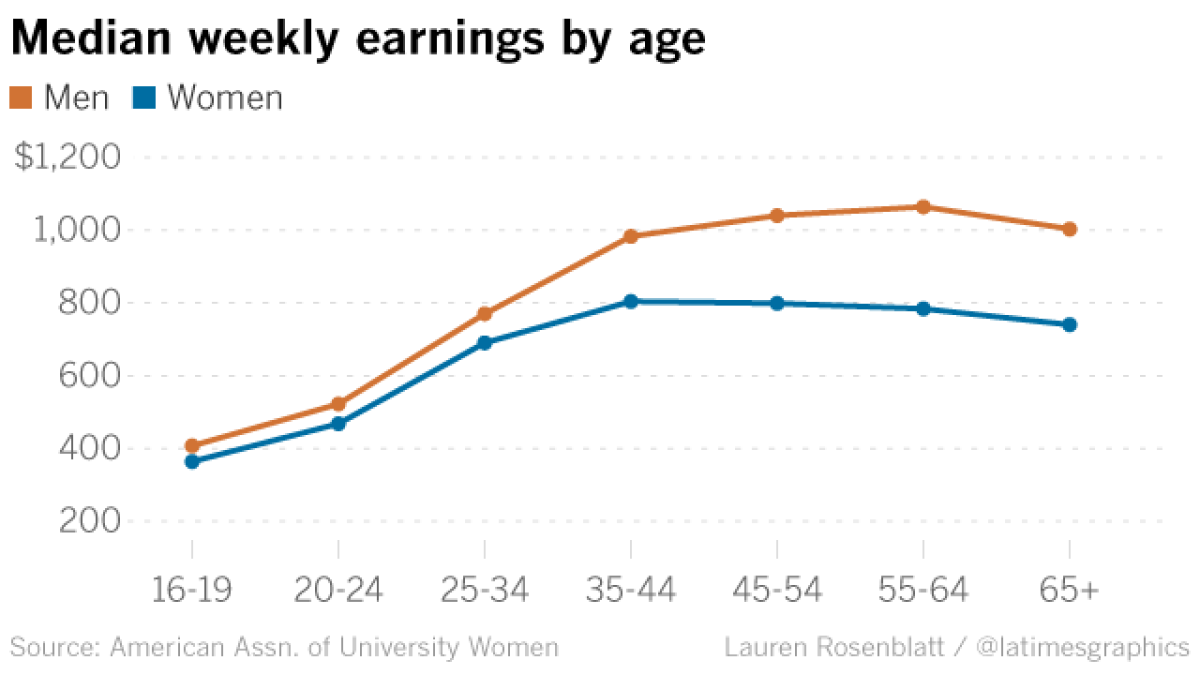If you weren’t raised in the Internet age, you may need to worry about workplace age discrimination

- Share via
The federal Age Discrimination in Employment Act turns 50 this year — about the age when many American workers begin to encounter the kinds of biases the law was intended to prevent.
At this “milestone of middle age,” quipped Victoria Lipnic, acting chair of the U.S. Equal Employment Opportunity Commission, the law is grappling with new forms of age discrimination in the Internet era.
Research by EEOC, which received 20,857 claims of age discrimination last year, found that 65% of older workers say age is a barrier to getting a job.

The issue has taken on even greater importance as American workers delay retirement and stay in the workplace longer, pushing up the median age in the U.S. labor force.

Here’s a look at some of the trends in age discrimination:
‘Digital natives’ vs. ‘digital immigrants’
In job ads, some employers have begun listing “digital native” as a requirement for the position. The term, many say, is a “code word” for young workers who have grown up with technology and will be able to use new systems with ease.
This term plays into stereotypes that “digital immigrants” — usually older workers who came of age before the Internet — will be slow to adapt to technology, reluctant to learn and costly to train.
Older workers are sometimes labeled as “technophobic,” said Sara Czaja, director of the Center for Research and Education on Aging and Technology Enhancement.
But contrary to stereotypes, research does not show a correlation between age and work performance. If tasks are based on speed and accuracy, Czaja conceded that age may play a factor in an employee’s productivity.
A 2010 study of adults aged 65-85 found that the majority of participants had a positive attitude toward using technology.
Of course, it is difficult to tell if companies are using the term “digital native” as a subtle form of discrimination or if they simply require an applicant proficient in certain technology skills.
Jacquelyn James, co-director for the Center on Aging and Work at
For something like a job description, James suggested putting together a team of people of different ages to ensure phrases like “digital native” aren’t giving off the wrong idea.
Women experience age discrimination before men
Although people of both genders struggle with age discrimination, research has shown women begin to experience age discrimination in hiring practices before they reach 50, whereas men don’t experience it until several years later.
In a 2015 study examining the effect of a date of birth listed on a resume, researchers found all applicants over age 64 were less likely than younger applicants to receive a request for an interview or an inquiry. However, middle aged women, ages 49-51, had a significantly lower callback rate than younger women, ages 29-31, while middle-aged men did not follow the same pattern.
The study also found discrimination toward older men was prominent in only select fields, but older women felt discrimination across the board.
And legal protections against age discrimination tend to skew more toward men. “Evidence suggests laws help older men more than older women,” said Patrick Button, one of the authors of the study and an assistant professor at Tulane University.
As women age, they also see more disparity in wages, with women 20-24 years old receiving 90% of men’s earnings while women over 65 make 74% of men’s wages, according to a 2017 study from the American Assn. of University Women using Census Bureau data.

Low unemployment could open spots for older workers
At the peak of job loss caused by the Great Recession, U.S. employment had fallen by 8.8 million jobs, according to an overview from the Bureau of Labor Statistics. Many older workers who were laid off simply dropped out of the job market permanently.
But with an
“We’re at a time in our economy right now, nearing the end of an expansion, where unemployment is very low… so it’s a time where change can occur. Companies dip into pools of workers that normally they ignore from discrimination,” said

As a result, the labor force participation rate for workers age 65 and older is projected to increase to 21.7% by 2024, from 18.6% in 2014, according to a 2015 report from the Bureau of Labor Statistics.
And older workers are expected to account for a higher share of the overall labor force.

Beware of application questions about your high school graduation
Just as technology is causing barriers inside the workplace for older employees, online applications and search engines could be hurting older workers looking for jobs.
Many applications have required fields asking for date of birth and high school graduation, something many older employees choose to leave off their resumes. The required field often deters older employees from completing the application, since they worry they don’t have a shot because of their age, and allows companies to screen out applicants based on age.
“Here’s the question: Why would you need someone’s date of birth? Do you ask them their sex, their race? No,” said Cathy Ventrell-Monsees, senior attorney adviser to the chair at the EEOC. “If it matters when someone gets a job, perhaps because there are benefits, then you ask for date of birth when they get the job.”
AARP is pushing for the EEOC to make a required field for date of birth or graduation date unlawful since “any time they’re using age in those algorithms that is a violation of the ADEA,” said Laurie McCann, an attorney with AARP Foundation Litigation.
Furthermore, McCann said, some search engines allow people to filter their search based on high school graduation date, thereby allowing employers and employees to screen people and positions out of the running.
Inside the business of entertainment
The Wide Shot brings you news, analysis and insights on everything from streaming wars to production — and what it all means for the future.
You may occasionally receive promotional content from the Los Angeles Times.







